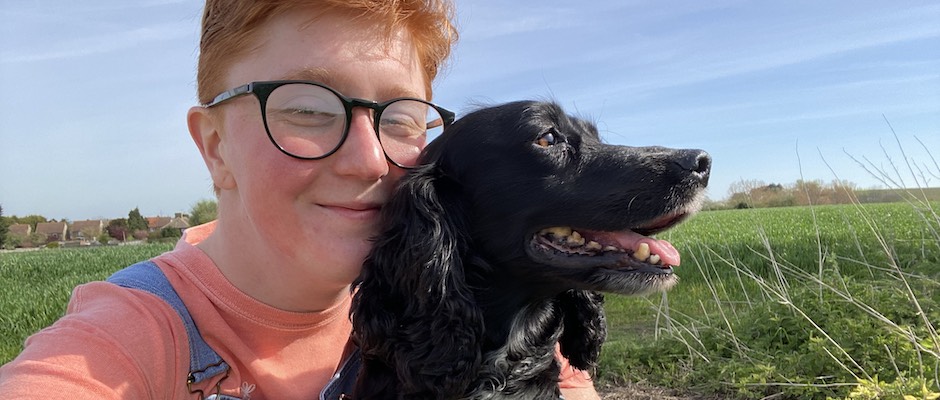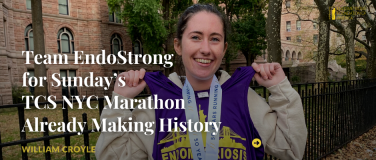
There is something uniquely remarkable about someone who, amidst their own painful experiences, chooses to use their voice to help others. The decision to build community, uplift others, and fight for change—all while in the thick of profound personal hardship—is an act of immense strength and grace. Such special people are what make difficult times bearable and far less lonesome.
Endo warrior and blogger Alexander Harman is one such special individual. As a 22- year-old transgender man in the UK with endometriosis and fibromyalgia, Alex has continually faced immense challenges in healthcare, from being constantly misgendered and dismissed by medical professionals, to facing staggeringly long wait times for care. And as so many of us with endo know, living each day in chronic, often debilitating pain makes tackling any healthcare obstacle that much more daunting. On top of the systemic treatment issues facing endo patients everywhere, Alex’s experience as a transgender man with what is often considered a “woman’s disease” has been fraught with profound challenges. Yet, despite the manifold difficulties of Alex’s endo journey, he has chosen to use his voice to build support and community for other transgender and non-binary endo patients.
In talking to Alex about everything from the barriers to trangender healthcare in the UK to the importance of comfort TV and crafts, I was struck by his warmth and wholehearted compassion. It was the same compassion and welcoming spirit that so infuses his Instagram blog, @trans_endo_chronicles, where I first became familiar with Alex. This colorful, inviting account is filled with informative posts centered around making endometriosis care more gender inclusive, as well as sharing some of Alex’s experiences navigating healthcare as a transgender man. With original artwork and easily digestible and effective infographics, Alex’s blog brings transgender and non-binary people into the endometriosis space, creating a welcoming and helpful forum for them to be a valued part of the conversation around endometriosis care.
For Alex, such a space for non-cisgendered endo patients was hard to find following his diagnosis a year ago. “I felt very disconnected from the endo community. I had joined other forums already, but they were very cisgender and heterosexual-conforming. So I wanted to find more queer people. I thought come on, I can’t be the only trans person out here with endo,” he shared. With the ubiquitous gendered language of “endo-sisters” across support groups and resources, the entrenched norms of endometriosis being an exclusively women’s disease made Alex feel isolated, unwelcome, and barred from community and necessary care. And so, without a welcoming space for transgender endo warriors, Alex decided to create one.
What began by connecting a small handful of mutual friends with endometriosis quickly grew into a thriving online community. Now with an audience that includes Europe and North America, the trans_end0_chronicles page has become an international safe space for transgender and non-binary endo patients, as well as a platform for raising awareness for this part of the endo community. “It’s been amazing because I just wanted to feel like I was closer with the community, and also to try to educate others that it’s not only women who have endometriosis,” Alex told me. His work is already making other endo spaces and resources more inclusive: “There have been so many people who have messaged me being like, ‘Oh wow this is really great, I actually used to not be very inclusive on my page and that was completely unintentional, but I’m very grateful that I now know how to use gender inclusive language.’”
Indeed, Alex’s educational tools on the trans_end0_chronicles page warmly invite people in to learn. He outlines how to use gender inclusive language surrounding endometriosis, as well as provides concrete advice on how to support trans folks more broadly. For Alex, the driving intention behind the blog is education and raising awareness: “I think it’s been kind of refreshing to try and talk about my experiences, but in a more educational viewpoint, rather than just venting.” In sharing his own journey, Alex’s blog offers an important perspective on living with chronic illnesses. From discussing topics such as the invisibility of chronic pain, mental health impacts, and gender dysphoria and euphoria from a personal lens, Alex’s vulnerability and wisdom shine light on many challenging experiences that are so often hidden, and in doing so implicitly gives others permission to do the same.
Yet, one of the reasons Alex’s voice is so powerful is that his painful journey with endometriosis and chronic illness has been long, arduous, and ongoing. Like many endo patients, Alex’s symptoms began soon after his first period at age 10. “I remember in my French class in year seven being folded in half with my head inches away from the desk because of my cramps,” he recalled. Now at 22, his symptoms have gotten increasingly debilitating, particularly alongside his fibromyalgia and a congenital heart defect. While working as a chef in the Alps in December of 2019, Alex began experiencing horrific bowel symptoms that made working next to impossible. “I was trying to cook and I was having to run to the toilet, sitting there for 15-20 minutes at a time. My partner, who was a host and wasn’t supposed to be cooking, had to watch the food for me because I couldn’t leave the toilet. It was just incredibly frustrating.”
With increasingly severe bowel and period pain, Alex’s general practitioner referred him to a gynecologist. With a whopping wait time of about a year just to see a gynecologist, Alex was left in limbo with crippling pain. In September 2021, after about half a year of waiting just to see a gynecologist, Alex’s symptoms were unbearable. “I was just in agony on my period. My bowels were so bad that I couldn’t sit down for seven days,” he explained. It was then that he decided to pay out-of-pocket for a consultation at a private hospital, where he finally received an endometriosis diagnosis along with ample other gastrointestinal testing to rule out other conditions.
His endo story then, like so many others, was marked by a long waiting game. “I was supposed to have my diagnostic surgery in June this year, and that has now been pushed back a year because of waitlists,” Alex shared. Indeed, the wait times for endometriosis care and treatment in the UK have reached crisis levels, with many patients waiting a year or more for surgery. Many are forced to resort to private healthcare options with significant out-of-pocket costs just to get treatment in a timely manner. For Alex, even a surgery at a private clinic is not an option: “I’ve tried to go privately initially, my parents had the funds to help me go privately. But because of my congenital heart defects, [the doctors] said it was too risky. They were worried I might die on the table and they didn’t have the cardiologist there. Even though you’re paying seven grand for surgery, they can’t get a cardiologist in.”
With exorbitant wait times for gynecologic care, surgery and even therapy, Alex, like so many other endo patients, has been left to cope in the meantime. Even with trying different medications for both his fibromyalgia and endometriosis pain—a task that is in itself a profoundly difficult challenge physically and mentally—Alex has been limited in the work he is able to do. After leaving a job he enjoyed as a farm worker due to debilitating chronic pain, Alex has since used his love of languages in his work as an online teacher. Yet even this work has been limited by his daily pain levels, and Alex now often uses a walking stick to move around due to his fibromyalgia (although, the walking stick is pretty cool. He rocks it).
Much of this story of long waits and immense daily pain is, sadly, quite familiar to the endo community. Yet, this experience of endo and chronic illness as a transgender man is an important narrative that has been missing from the endo community for far too long. From having to go to the “women’s health” wing of hospitals, to being misgendered and disrespected in healthcare settings, Alex’s journey in navigating his healthcare has demonstrated the importance of language in creating inclusive healthcare spaces. “I think it would be really awesome if we could dismantle this ‘women’s health/men’s health’ kind of issue, because at the end of the day, sure we’ll go into a waiting room, but you’re eventually seen in a private room separately, it doesn’t matter what gender you are,” he reflected. By centering intentional language on his Instagram account, Alex hopes to begin to change the narrative around gender in endometriosis care and beyond.
While Alex’s struggles with endometriosis are far from over, his advocacy and efforts for change in endo care will surely help other transgender and non-binary patients with their journeys. To those folks, Alex offers encouragement and support: “It really sucks, but just keep fighting for your own health,” he urged. “Keep advocating for yourself. Keep correcting someone if they misgender you. If you’re persistent, they’ll catch on.”
Alex is someone who invites people in to be their fullest, most authentic selves. In the endometriosis space, this is particularly essential for patients who have been marginalized and made to feel excluded and unworthy of the right care. For transgender and non-binary patients, Alex hopes to shift the endo care landscape to be not only inclusive, but affirming and welcoming. “Even though the medical world isn’t geared towards them, they’re most certainly really not alone.”









